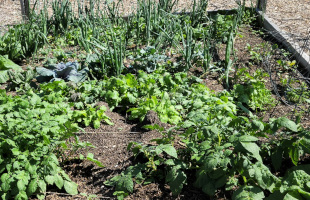
A juvenile root-knot nematode (Meloidogyne incognita) penetrates a tomato root on Jan. 24, 2013. Once inside, the juvenile, which also attacks cotton roots, causes a gall to form and robs the plant of nutrients Photo by William Wergin and Richard Sayre. Colorized by Stephen Ausmus.
Root-knot nematodes are common in Texas and the South. They are small, almost microscopic, eel-like worms that infest the roots of plants. In addition to feeding on the tissue of the plant, they cause galls to form on the roots (the root-knot) and the roots cannot carry water and nutrients up to the rest of the plant. The plant wilts and dies.
Do You Have Root-Knot Nematodes
Diagnosis involves pulling up an infected plant and looking for the root galls on the roots. If they are there, you have a problem. Forget chemical control — fumigating the soil is expensive and the chemicals are extremely toxic. You will kill not only the nematodes but anything else in the area.
Use Cultural and Biological Control
No, control is cultural and biological. If you have plants that are infested, burn or trash them. Composting them will only spread the nematode further throughout your property. Most homeowner compost piles are not hot enough to kill the nematodes.
Take Care Of Your Plants
Do everything you can to keep your plants healthy — water regularly and correctly, fertilize, prune, and baby your plants. A healthy plant can resist the nematode better. In addition, it can tolerate more nematodes without dying.
Sun Solarization
Sun solarization is the preferred way of killing the nematodes. During the summer, you cover your plot with clear plastic. Weight the edge down with rocks. Leave it there for about six weeks. This obviously has a downside in that you cannot use the plot for a season.
Rotate Crops
Rotating crops helps as it slows the build-up of nematodes. Do not plant plants from the same family in the same place in the plot two plantings in a row. This is especially important with tomatoes and other plants nematodes love.
Nematode Resistant Tomatoes
Speaking of tomatoes, there are nematode-resistant varieties. Make sure you use nematode-resistant tomatoes and any other vegetable you can find. Not only will that produce a better crop, but the less food for the nematodes, the fewer nematodes there are.
Marigolds To The Rescue
Finally, research has shown that marigolds, and particularly French marigolds, lessen the infestation of nematodes where they are planted. Consider planting them between seasons or on fallow spots to help combat nematodes.

Want to learn to garden? My first attempt at gardening ended up in failure. The weeds took over and squeezed the vegetables out. I was very frustrated by this waste of good seed, time, and money. So I became a master gardener and spent a lot of time helping other people avoid or overcome problems in their garden.
In order to help others garden successfully, I have written a book, Vegetable Gardening from the Ground Up, available in an ebook or a paperback from Amazon. It is also in Kindle Unlimited.

